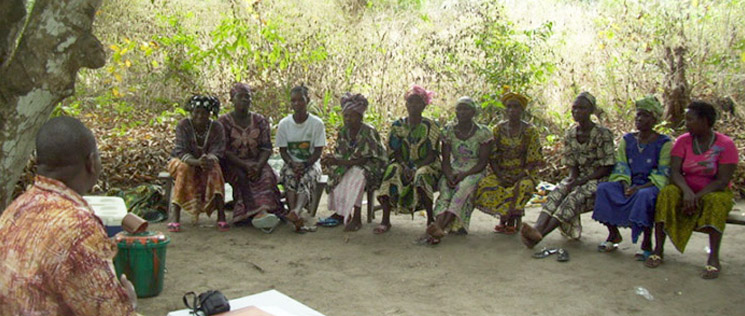
Village Partnerships: Masseleh

Partner: Crossroads Wesleyan Church
Population: 311
Households: 51
Status: Active
Location: Bombali District, Sierra Leone
Village History
Masseleh is located in the Safroko Limba Chiefdom, which is 15 miles from the principle town of Makeni. The inhabitants are of the Limba tribe Villagers and they are primarily subsistence farmers growing rice, cassava and peanuts.
Prior to any World Hope International (WHI) involvement, the village was in desperate need of clean water, improved education, leadership development, greater food security and church and school renovations. Without a safe, year-round water supply, people were forced to consume contaminated water. This caused diarrhea, dehydration and even death, especially among young children. Moreover, a lack of sanitation facilities in the form of ventilated pit toilets, as well as a lack of knowledge about how disease is spread continuously led to poor hygiene and, consequently, the spread of preventable illness.
Crossroads Wesleyan Church based in Imperial, Nebraska began a partnership with the people of Masseleh, Sierra Leone in September 2012. Facilitated by WHI, Crossroads has helped to promote leadership development, hygiene training and education, more effective food storage, spiritual growth and improved farming techniques in this small, rural village located in the Bombali District.
Completed Activities & Impact
Clean Water Wells & SanitationWHI provided a drilled borehole well, which created much excitement in Masseleh. Their previous source of water was a hand dug well which dried out every year during the dry season. When the hand dug well dries out, the village is left only with an unsafe water source; which leads to many health problems and diseases. A drilled borehole well goes much deeper than a hand dug well and is able to provide access to clean, safe water, even in the dry season.
Rural and Economic DevelopmentWHI worked with each village to form and train a Village Development Committee (VDC). Community members elected trustworthy people of good reputation to serve on the VDC, including religious leaders, chiefs, head farmers and women. The VDC worked with WHI to encourage participation in development activities, steward project resources and hold their community accountable. The committee strategized about future development planning and discusses solutions to current problems, acting as the primary change agent in the village through collective action.
AgricultureProviding regular visits to monitor and evaluate the VDC’s progress and farmer education is crucial to the success of the program interventions and the long term sustainability of the impacts created. Last year, WHI and agronomist, Aruna Koroma, routinely visited farms to troubleshoot and give training to the villages’ farmers. Aruna also taught better methods for selecting seeds and preserving them for the next planting cycle, as well as how to protect food stocks from pests.
Moreover, seed banks were established. Seed banks provide a constant source of seeds for Masseleh. When it is time to plant, farmers receive a portion of seeds from a seed bank, which is managed by the VDC. After harvest, farmers return the amount of seed they loaned from the group with minimal interest. Seed banks mobilize community resources to provide for the common good, strengthening the entire village. Before planting, farmers are given a seed loan (2 bushels), which they are responsible for paying back at harvest. Any additional seeds that the harvest yields are used as food or sold as income generation. The seeds in the seed bank are kept in a safe place for replanting the next season. Masseleh paid back 100% of the seed loans received and had plenty of extra to save for the following season.
In addition, drying floors were also constructed so that seeds can be properly stored through the wet season. They enable farmers to thoroughly dry their kernels so they do not mold in storage. Preparation of this sort allows for higher yields to save and use for income generation, an important source of food security.
Finally, a poultry project was introduced to the Masseleh village. WHI staff led the people in building a simple poultry house from bamboo. Eighty cockerel chicks were given to rear until they were large enough to distribute to each family. In August 2014, 40 cocks were distributed to 20 families. These cocks breed with the small local hens to produce larger offspring. This will provide more meat in the future.
Health and NutritionWHI helped Masseleh establish Community Health Peer Educators, which are comprised of people in the village who are respected and have influence within the community. The Peer Educators were taught about sanitation techniques, including hand washing to prevent disease and how to make an Oral Rehydration Solution (ORS), to rehydrate from severe diarrhea.
In addition, village members were trained in the proper disposal of human waste and a monthly cleaning schedule was created as a constant reminder to the community. These measures have a broad impact in the village and improve the health of all.
Moreover, mosquito nets were distributed to every household with children under five years of age or a pregnant woman. The nets are accompanied by Malaria awareness and prevention training, which motivates families to use the nets for maximum health benefit. Malaria poses a constant threat to the people of Masseleh because they carry the disease, which is most active at night. By sleeping under an insecticide treated bed net, the risk of contracting malaria is reduced.
Finally, a The Mother Support Groups (MSG) was established in Messeleh. These are action oriented group sessions uses the UNICEF materials. The topics included are nutrition during pregnancy and lactation, breastfeeding, good hygiene and sanitation, and growth monitoring of their children. This group holds monthly meetings where they discuss health issues affecting their communities.